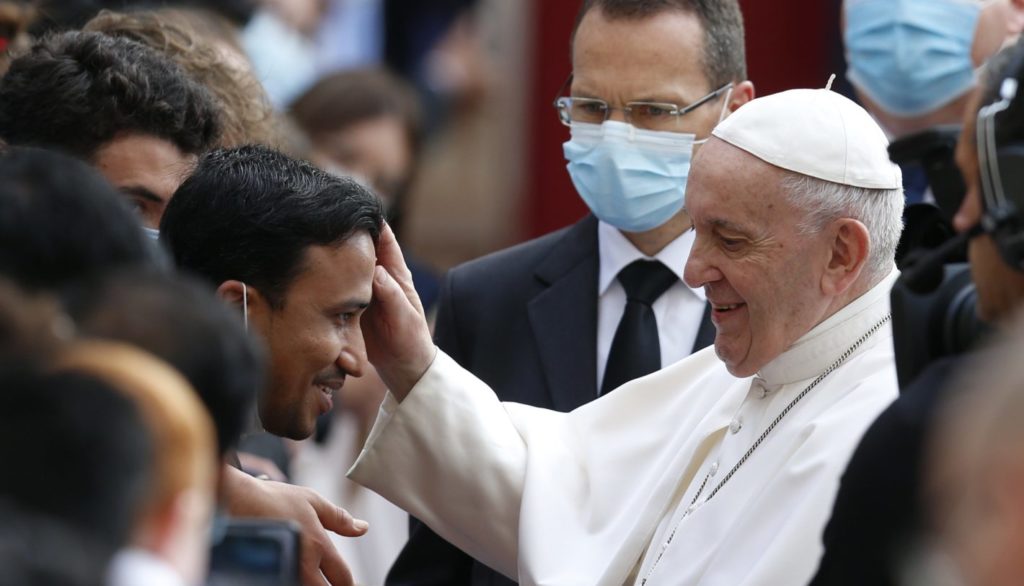 "The Eucharist is an effective medicine against human closed-mindedness."
"The Eucharist is an effective medicine against human closed-mindedness." Pope reminds us that Christ is the model for our prayer
Pope reminds us that Christ is the model for our prayer "The Trinity makes us contemplate the mystery of love from which we come."
"The Trinity makes us contemplate the mystery of love from which we come."Pope Francis dedicated the penultimate catechesis on prayer to talk about perseverance in prayer. "It is an invitation, indeed, a commandment that comes to us from Sacred Scripture. The spiritual journey of the Russian pilgrim begins when he encounters a phrase of St. Paul in his first letter to the Thessalonians: "Pray constantly. In everything give thanks" (5:17-18). The Apostle's words touch this man and he wonders how it is possible to pray without interruption, given that our life is fragmented into many different moments, which do not always make it possible to concentrate. From this questioning begins his search, which will lead him to discover the so-called prayer of the heart. This consists in repeating with faith: "Lord Jesus Christ, Son of God, have mercy on me, a sinner". A prayer that, little by little, adapts to the rhythm of breathing and extends to the whole day. In fact, breathing never ceases, not even while we sleep; and prayer is the breath of life".
"How is it possible to always maintain a state of prayer," Francis asked. "The Catechism offers us very beautiful quotations, taken from the history of spirituality, which insist on the need for continuous prayer, which is the fulcrum of Christian existence. I quote some of them.
Referring to St. John Chrysostom, a pastor attentive to concrete life, the Pope paraphrased those words of his that say: "It is fitting for a man to pray attentively, whether he is sitting in the marketplace or taking a stroll; it is fitting for him who sits at his desk or spends his time at other tasks to lift up his soul to God; it is fitting for a rowdy servant or one who wanders about, or one who is serving in the kitchen" (n. 2743). Prayer, therefore, is a kind of musical stave on which we place the melody of our life. It is not contrary to daily work, it is not in contradiction with the many small obligations and encounters, if anything it is the place where every action finds its meaning, its reason and its peace.
The Holy Father is aware that putting these principles into practice is not easy: "A father and a mother, busy with a thousand tasks, can feel nostalgic for a period of their life when it was easy to find time for prayer and prayerful moments. Then there are children, work, the chores of family life, parents who grow old... One has the impression of never being able to reach the top of everything. So it is good to think that God, our Father, who must take care of the whole universe, always remembers each one of us. Therefore, we too must remember Him!
The example of monasticism can help us, the Pope suggested in the audience: "We can recall that in Christian monasticism work has always been held in great esteem, not only because of the moral duty to provide for oneself and others, but also for a kind of inner balance: it is risky for man to cultivate an interest so abstract that he loses contact with reality. Work helps us to remain in touch with reality. The monk's clasped hands bear the calluses of those who wield shovel and hoe. When, in Luke's Gospel (cf. 10:38-42), Jesus tells St. Martha that the only thing really necessary is to listen to God, he does not at all mean to belittle the many services she was doing with such commitment".
Almost at the end, he warned against the danger of allowing oneself to be carried away by work and neglecting the time for prayer: "In the human being everything is "binary": our body is symmetrical, we have two arms, two eyes, two hands... So work and prayer are complementary. Prayer - which is the "breath" of everything - remains the vital background of work, even in the moments when it is not explicit. It is dehumanizing to be so absorbed in work that we no longer find time for prayer.
Finally, he recalled that "a prayer that is alienated from life is not healthy. A prayer that alienates us from the concreteness of life becomes spiritualism, or ritualism. Let us remember that Jesus, after showing his disciples his glory on Mount Tabor, did not want to prolong that moment of ecstasy, but went down the mountain with them and resumed his daily journey. Because that experience had to remain in their hearts as the light and strength of their faith. Thus, the times dedicated to being with God enliven faith, which helps us in the concreteness of life, and faith, in turn, nourishes prayer, without interruption. In this circularity between faith, life and prayer, the fire of Christian love that God expects from each one of us is kept burning.











